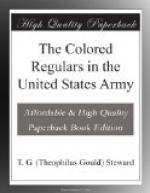A.
How the black st. Domingo legion saved the patriot army in the siege of Savannah, 1779.
The siege and attempted reduction of Savannah by the combined French and American forces is one of the events of our revolutionary war, upon which our historians care little to dwell. Because it reflects but little glory upon the American arms, and resulted so disastrously to the American cause, its important historic character and connections have been allowed to fade from general sight; and it stands in the ordinary school text-books, much as an affair of shame. The following, quoted from Barnes’ History, is a fair sample of the way in which it is treated:
“French-American Attack on Savannah.—In September, D’Estaing joined Lincoln in besieging that city. After a severe bombardment, an unsuccessful assault was made, in which a thousand lives were lost. Count Pulaski was mortally wounded. The simple-hearted Sergeant Jasper died grasping the banner presented to his regiment at Fort Moultrie. D’Estaing refused to give further aid; thus again deserting the Americans when help was most needed.”
From this brief sketch the reader is at liberty to infer that the attack was unwise if not fool-hardy; that the battle was unimportant; and that the conduct of Count D’Estaing immediately after the battle was unkind, if not unjust, to the Americans. While the paragraph does not pretend to tell the whole truth, what it does tell ought to be the truth; and this ought to be told in such a way as to give correct impressions. The attack upon Savannah was well-planned and thoroughly well considered; and it failed only because the works were so ably defended, chiefly by British regulars, under brave and skillful officers. In a remote way, which it is the purpose of this paper to trace, that sanguinary struggle had a wider bearing upon the progress of liberty in the Western World than any other one battle fought during the Revolution.
But first let us listen to the story of the battle itself. Colonel Campbell with a force of three thousand men, captured Savannah in December, 1778; and in the January following, General Prevost arrived, and by March had established a sort of civil government in Georgia, Savannah being the capital. In April, the American general, Lincoln, feeble in more senses than one, perhaps, began a movement against Savannah by way of Augusta; but Prevost, aware of his purpose, crossed into South Carolina and attempted an attack upon Charleston. Finding the city too well defended, he contented himself with ravaging the plantations over a wide extent of adjacent country, and returned to Savannah laden with rich spoils, among which were included three thousand slaves, of whose labor he made good use later.




